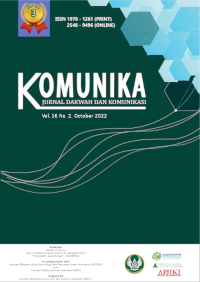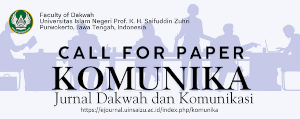Utilize Podcasts as Literacy and Educational Media
DOI:
https://doi.org/10.24090/komunika.v16i1.6784Keywords:
Covid-19, learning medium, literacy, podcastAbstract
The use of digital media during the Covid-19 pandemic has helped us to continue carrying out activities and social connections during the period of activity restrictions. Podcasts are digital media used by numerous people to find various information needs. This study aims to explore the use of podcasts as learning media as well as media literacy. The method used in this paper is descriptive qualitative with in-depth interview data collection techniques for podcasters who use podcasts for literacy and educational activities. In triangulation, the researcher also interviewed the students who listened to podcasts as a medium for literacy and learning. The results of this study indicate that podcasts have benefits as a source of information for literacy and education. During the Covid-19 pandemic, podcasts are complementary to digital-based learning media such as zoom, G-meet, or MS-Team, commonly used in learning activities. Podcasts have the flexibility to be listened to in various places and situations. Podcasts are also equipped with a rewind feature to allow listeners to understand a topic better.Downloads
References
Auliya, Sarah Putri. (2020). Komunikasi Antarpribadi di Ruang Publik Berbasis Digital: Analisis Self-Disclosure dalam Podcast Bagi Suara. Metakom: Jurnal Kalian Komunikasi, 4(1), 15-27.
Berry, Richard. (2016). Podcasting: Considering The Evolution of The Medium and Its Association with The Word ‘Radio’. The Radio Journal International Studies in Broadcast and Audio Media, 14(1), 7-22.
Berry, R. (2016a). Part of the establishment: Reflecting on 10 years of podcasting as an audio medium. Convergence, 22(6), 661–671.
Budiharto, Triyono, & Suparman. (2018). Literasi Sekolah Sebagai Upaya Penciptaan Masyarakat Pebelajar Yang Berdampak Pada Peningkatan Kualitas Pendidikan. Ilmu Sejarah, Sosial, Budaya Dan Kependidikan, 5(1), 153–166
Copley, Jonathan. (2007). Audio and video podcast of lectures for campus-based student: production and evaluation of student use. Innovation in Education and Teaching International, 44 (4): 387 - 399
Creswell, J. W. (2009). Research Design, Qualitative, Quantitative, And Mixed Methods Approach (Third). Sage Publications Sage CA: Los Angeles, CA
DailySocial & JakPat. (2018). Survei Penggunaan Layanan Podcast 2018.
Damaryanti Sri Nyoman. (2021), Prinsip dan Pembelajaran 2021/2022 Untuk Guru https://www.sahabatsains.com/2021/07/prinsip-dan-strategi-pembelajaran-tahun.html
Dwyer, T. (2010). Media convergence. McGraw-Hill Education (UK).
Fidler, R. F. (1997). Mediamorphosis: Understanding new media. Pine Forge Press.
GS Runtiko. (2012), Konvergensi Media Masyarakat Desa, Jurnal Observasi, Volume 10
Geoghegan, M. W., & Klass, D. (2008). Podcast Solutions: The complete guide to audio and video podcasting.
Idham Imarshan, POPULARITAS PODCAST SEBAGAI PILIHAN SUMBER INFORMASI BAGI MASYARAKAT SEJAK PANDEMI COVID-19 , Perspektif Komunikasi: Jurnal Ilmu Komunikasi Politik dan Komunikasi Bisnis Vol 5 No 2 Des 2021 pp. 213-221
Karman. (2013). Riset Penggunaan Media dan Perkembangannya Kini. Jurnal Studi Komunikasi dan Media, 17(1), 103-121.
Littlejohn, Stephen W. (1996). Theories of Human Communication.California: Belmont, Woodsworth.
Littlejohn, Stephen W Littlejohn dan Karen A Foss. (2009). Teori Komunikasi, Theories of Human Communication, Edisi 9, Jakarta: Salemba Humanika
Miles, Mattew B. dan A. Michael Huberman. (1992). Qualitative Data Analysis: A Sourcebook of New Method. Terjemahan Tjetjep Rohendi Rohidi. Analisis Data Kualitatif: Buku Sumber tentang Metode-metode Baru. Jakarta: Penerbit Universitas Indonesia (UI-PRESS).
Moleong, L. J. (2019). Metode penelitian kualitatif (Edisi Revisi). RosdaMcHugh, S. (2014). Audio storytelling: Unlocking the power of audio to inform, empower and connect. Asia Pacific Media Educator, 24(2), 141– 156.
Moleong, Lexy J. (2000). Metodologi Penelitian Kualitatif. Bandung: PT Remaja Rosdakarya
Nugroho, Irwan, Irwansyah. (2021). Konvergensi Konten Audio di Media Online (Studi Kasus Podcast Detik.com), Jurnal Komunikasi , Volume 15 No 1 Maret 2021(55-70)
Nurudin. (2007). Pengantar Komunikasi Massa Jakarta: Rajagrafindo Persada.
Susilowati, Ratna Dwi, Sutama, dan Nuqhty Faiziyah. (2020). Penerapan Podcast pada Aplikasi Spotify sebagai Media Pembelajaran Matematika di Tengah Pandemi Covid-19. Jurnal Riset Pendidikan dan Inovasi Pembelajaran Matematika, 4(1), 68-78.
Suyono, Harsiati, T., & Wulandari, I. S. (2017). Implementasi gerakan literasi sekolah pada pembelajaran tematik di sekolah dasar. Suyono Titik Harsiati Ika Sari Wulandari Universitas, 26(2), 116–123.
Slavin, Robert E. (2009) Psikologi Pendidikan; Teori dan Praktek, diterjemahkan oleh Marianto Samosir, (Jakarta Barat: PT Indeks)
Tucker, Catlin R. (2012) Blended Learning in Grades 4–12. London, CorwinPress
Tucker, Catlin. (2020). Synchronous vs. Asynchronous How to Design Each Type of Learning. Diakses: https://catlintucker.com/asynchronous-vs-synchronous
Zellatifanny, Cut Medika. (2020). Tren Diseminasi Konten Audio on Demand melalui Podcast: Sebuah Peluang dan Tantangan di Indonesia. Jurnal Pekommas, 5(2), 117-132.
West, Richard dan Turner, Lynn H. (2009). Pengantar Teori Komunikasi: Analisis dan Aplikasi (Introducing Communication Theory: Analysis and Application). Jakarta: Salemba Humanika

Downloads
Published
Issue
Section
License
Copyright (c) 2022 Meilani Dhamayanti

This work is licensed under a Creative Commons Attribution-ShareAlike 4.0 International License.
Authors who publish with this journal agree to the following terms:
- Authors retain copyright and grant the journal right of first publication with the work simultaneously licensed under a Creative Commons Attribution-ShareAlike 4.0 International License that allows others to share the work with an acknowledgement of the work's authorship and initial publication in this journal.
- Authors are able to enter into separate, additional contractual arrangements for the non-exclusive distribution of the journal's published version of the work (e.g., post it to an institutional repository or publish it in a book), with an acknowledgement of its initial publication in this journal.
- Authors are permitted and encouraged to post their work online (e.g., in institutional repositories or on their website) prior to and during the submission process, as it can lead to productive exchanges, as well as earlier and greater citation of published work (See The Effect of Open Access).
























